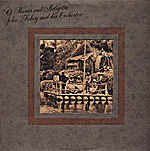John Fahey and
His Orchestra
His Orchestra
Of Rivers and Religion
One of the most influential instrumentalists of our time, guitarist John Fahey launched a whole new genre of music with his first album, issued in 1958 in an edition of 95 copies. Since then his music has grown steadily in perception, perfection and popularity. Today his name is a password for guitar connoisseurs; his emulators are legion.
Sleeve Notes to:
Of Rivers and Religion

Elemental Times and Places
John Fahey's basic materials are the building blocks of American music - blues, jazz, country and gospel. All of these are represented in Of Rivers and Religion, a finely tuned mixture of traditional and original elements with a special emphasis on Southern styles, harking back to the formative years of ragtime and jazz at the turn of the century. Gospel music is also well served with Fahey's imaginative (yet faithful) evocations of both black and white forms.
Homegrown Classics
Fahey's guitar technique is likewise rooted in American tradition. Probably his greatest early inspirations were recordings by Charley Patton, Elizabeth Cotten and Mississippi John Hurt (who is most eloquently eulogized on this album). However, Fahey is also a serious student of classical music; if asked to name his influences, he will give as much credit to Jean Sibelius and CHarles Ives as to the folk and blues men. In fact Fahey often describes himself as a classical musician; his harmonies and concepts of form set him miles apart from your usual folk guitarpicker. Throughout this album, simple folk ideas are subtly transformed into something highly original, while retaining their simplicity. In Fahey's hands, home grown music takes on an indefinable, almost otherworldly quality.
Turtles and Transfigurations
No wonder, then, that Fahey long ago gained a reputation as an eccentric mystic, a reputation he himself has done little to contradict. The liner notes to some of his early LPs on his own Takoma label are masterpieces of obscurantism. And then there are the album titles: Death Chants, Breakdowns and Military Waltzes, Dance of Death and Other Plantation Favorites, The Transfiguration of Blind Joe Death and The Great San Bernardino Birthday Party. Another title, Voice of the Turtle, gives a clue to John's hobby, the care and feeding of turtles and tortoises. Among his other accomplishments is a master's thesis (UCLA) on the music of Delta bluesman Charley Patton. By the way, it was Fahey (and Bill Barth) who discovered the legendary Skip James in a Mississippi hospital; Fahey (with ED Denson) also rediscovered the equally storied Bukka White.
...and his orchestra
As with previous Fahey albums, most of the music here is solo acoustic steel-string guitar. For "Texas and Pacific Blues," "Lord Have Mercy" and others, Fahey is joined by a group including renowned jazzmen Nappy LaMare and Joe "Yellow Dog Blues" Darensbourgh. Jack Feierman and Chris Darrow are among the other featured players. The album was produced by John, together with Denny Bruce, who has produced two chart albums by Leo Kottke.
John Fahey's basic materials are the building blocks of American music - blues, jazz, country and gospel. All of these are represented in Of Rivers and Religion, a finely tuned mixture of traditional and original elements with a special emphasis on Southern styles, harking back to the formative years of ragtime and jazz at the turn of the century. Gospel music is also well served with Fahey's imaginative (yet faithful) evocations of both black and white forms.
Homegrown Classics
Fahey's guitar technique is likewise rooted in American tradition. Probably his greatest early inspirations were recordings by Charley Patton, Elizabeth Cotten and Mississippi John Hurt (who is most eloquently eulogized on this album). However, Fahey is also a serious student of classical music; if asked to name his influences, he will give as much credit to Jean Sibelius and CHarles Ives as to the folk and blues men. In fact Fahey often describes himself as a classical musician; his harmonies and concepts of form set him miles apart from your usual folk guitarpicker. Throughout this album, simple folk ideas are subtly transformed into something highly original, while retaining their simplicity. In Fahey's hands, home grown music takes on an indefinable, almost otherworldly quality.
Turtles and Transfigurations
No wonder, then, that Fahey long ago gained a reputation as an eccentric mystic, a reputation he himself has done little to contradict. The liner notes to some of his early LPs on his own Takoma label are masterpieces of obscurantism. And then there are the album titles: Death Chants, Breakdowns and Military Waltzes, Dance of Death and Other Plantation Favorites, The Transfiguration of Blind Joe Death and The Great San Bernardino Birthday Party. Another title, Voice of the Turtle, gives a clue to John's hobby, the care and feeding of turtles and tortoises. Among his other accomplishments is a master's thesis (UCLA) on the music of Delta bluesman Charley Patton. By the way, it was Fahey (and Bill Barth) who discovered the legendary Skip James in a Mississippi hospital; Fahey (with ED Denson) also rediscovered the equally storied Bukka White.
...and his orchestra
As with previous Fahey albums, most of the music here is solo acoustic steel-string guitar. For "Texas and Pacific Blues," "Lord Have Mercy" and others, Fahey is joined by a group including renowned jazzmen Nappy LaMare and Joe "Yellow Dog Blues" Darensbourgh. Jack Feierman and Chris Darrow are among the other featured players. The album was produced by John, together with Denny Bruce, who has produced two chart albums by Leo Kottke.